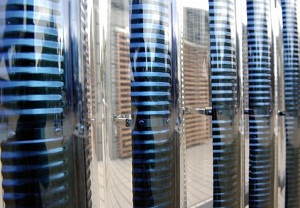Universities open solar thermal certification programs
 Two eastern U.S. universities will soon become homes to accredited solar thermal testing facilities, which should help reduce the backlog of solar thermal devices seeking certification In some cases, projects have been waiting four years.
Two eastern U.S. universities will soon become homes to accredited solar thermal testing facilities, which should help reduce the backlog of solar thermal devices seeking certification In some cases, projects have been waiting four years.
These new testing facilities are being completed at North Carolina State University and the University of New Haven in Connecticut.
The universities will join the five other U.S. solar thermal testing facilities certified by the Florida-based nonprofit Solar Rating and Certification Corp. (SRCC).
SRCC was created in 1980 by state organizations and a solar industry association to provide a standard testing and certification process for solar products. The organization is responsible for certifying the reliability and durability of solar products.
The North Carolina Solar Center (NCSC) Testing Laboratory is actually already open.
It’s operating under one certification but is waiting to file for SRCC certification, said Tommy Cleveland, Solar Energy Engineer with NCSC.
“We are required to do this before accreditation, and we have completed the minimum period to qualify for application,” he said.
The university could apply as soon as June for accreditation. And the process could take four to six months following that period to be approved.
The SRCC approval for the testing facility will only cover glazed liquid- based solar thermal collectors, Cleveland said.
“This includes the most common types of collectors used on homes and businesses for hot water, including both flat plate collectors and evacuated tube collectors,” he said. “We hope to branch out to other thermal collector testing (pool heaters), and photovoltaic systems and collectors. This would be accredited where applicable.”
Such an expansion would be based on revenue from the SRCC-based testing and other funding, he said.
While outside of the scope of the SRCC certification, the NCSC also tests solar and other renewable products upon request, including energy efficient equipment and systems and demonstration projects. However, that work is not under accreditation with SRCC, and there is no accreditation standard for such testing.
The NCSC won a $100,000 grant from the North Carolina Green Business Fund from the Department of Commerce in 2009. The center will pay for an additional $100,000 to support the lab.
The University of New Haven facility is being built at the Tagliatela College of Engineering and has received $500,000 from the United States Department of Energy and $100,000 from the Connecticut Clean Energy Fund. That facility is slated for completion in 2012.
SRCC certifications are becoming more important for solar devices because many states and the federal government have tied incentives to properly certified devices in an attempt to assure that devices meet minimum standards.
This new requirement has led to a testing backlog of up to four years for products as companies race to bring their new products to market.
Image courtesy of NREL.



